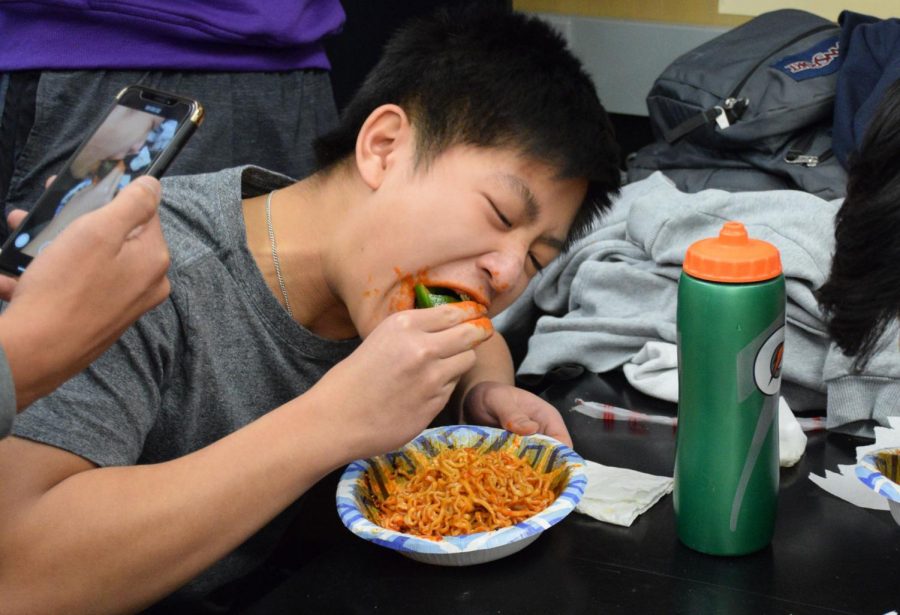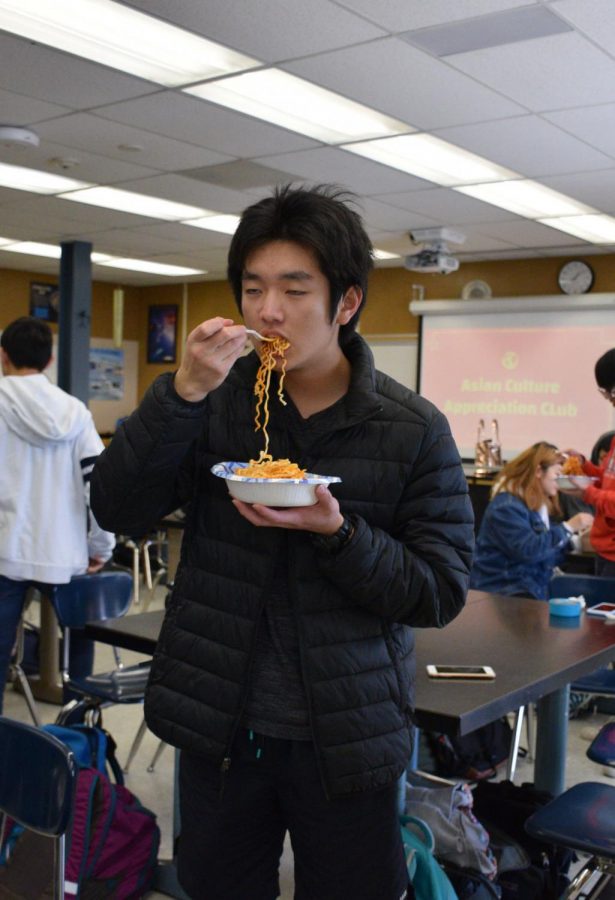Spicy Noodles Bring Competitors to Tears
February 18, 2020
The Asian Culture Appreciation Club’s 3rd annual Fire Noodle Challenge charity event featured 30 students competing in the chow-down on February 7.
Inspired by a Korean internet food challenge, competitors each donated $5 and then raced to finish a cold bowl of noodles drowned in pepper sauce. Spectators could also participate by paying $2 for a chili pepper to be dropped into their friends’ bowls. The club generated $123 from the event, which they plan on donating to the relief efforts for the Australian bush fires.
Growing from only 7 participants last year to 30 this year, “this was the most successful 1 from the past 3 years,” said co- club president senior Brightan Ying. “We had teachers participate as well as counselors express interest in participation.”
As the countdown was called and the competition began, onlookers cheered and filmed their friends, but as time went on, participants with low tolerances dropped out and scattered to search for water bottles or water fountains.
Some competitors developed bloodshot eyes and puffy lips while spectators found the ordeal extremely entertaining. “My friend who I was watching was breathing really heavily and this other girl was literally sobbing. It was hilarious,” said junior Mia Chon.
“It was honestly really fun. The noodles weren’t too bad until you stopped eating them and that’s when they got painful. Seeing my friends start crying from the spice was really funny,” said junior Robby Nykodym, 1 of the few competitors who actually finished an entire bowl.
“A lot of the people who actually did it this year weren’t actually in the club so it kind of brought a lot of more different people in,” said co-club president senior Julia Zapanta.
Ying believes that the competition was a humbling experience for those who wanted to prove their ability to eat spicy food, but underestimated how hot the noodles were. “There was this girl who said ‘People who think these are spicy are probably cowards.’ She took a bite of it and had to run out of the classroom to the multi-use room, and she actually bought milk,” said Ying.
“I saw someone that was so devoted to finishing her noodles that she stayed late and showed up to math class 20 minutes late. She was in so much pain, but she finished,” said spectator junior Justin Xiao.
Most students were scared by the potential of burning their pallets. “I think lots of people thought about doing the challenge, but once they saw everyone crying and screaming in pain, they immediately turned away and changed their minds,” said Chon.
Ying acknowledged that there is a component of pain, but believes it is a completely harmless activity.
“A lot of the people who participated last year actually came back again,” said Ying. “People are also masochists, but even more than that when people go through hardships together, they become closer, so it’s like a completely non-dangerous, hazing, or in other words, bonding activity.”
Junior Cooper Schnurr was inspired to cash in on the event by selling milk cartons to competitors struggling to combat the painful side effects of the noodles. “I knew that some people wouldn’t be able to handle the spice, so I decided to share the antidote and make some cash along the way,” said Schnurr.
Teachers also made an appearance at the event. “This is obviously the pinnacle event for the Asian club and I thought this would be a fun way to support them,” said Leadership teacher Lindsay Webb-Peploe, who bought a bowl of noodles. She added that “other teachers should do it as well.”
“It was so hot. It was like my mouth was on fire and I don’t even think I finished the whole thing,” Webb-Peploe added.
While the focus of the challenge was on charity, the fastest noodle-eaters earned candy prizes. Top-finishers this year included senior Brent Anevell, Connor Spires, David Ona, and Alexandra Montee.
Co-Presidents Ying and Zapanata will be graduating this year but hope that the Fire Noodle Challenge legacy lives on. “Based on the the growth and just the 3 years that we’ve been doing it, I think it could become one of the main events of Campo,” said Ying.
Some students are already looking forward to next year’s event. “I think this is a very fun thing to do and I think it should become a campus tradition. Not only is it a bonding experience for students, but it ultimately allows many students to experience a type of food from a culture they probably don’t get to eat very often,” said Chon.



